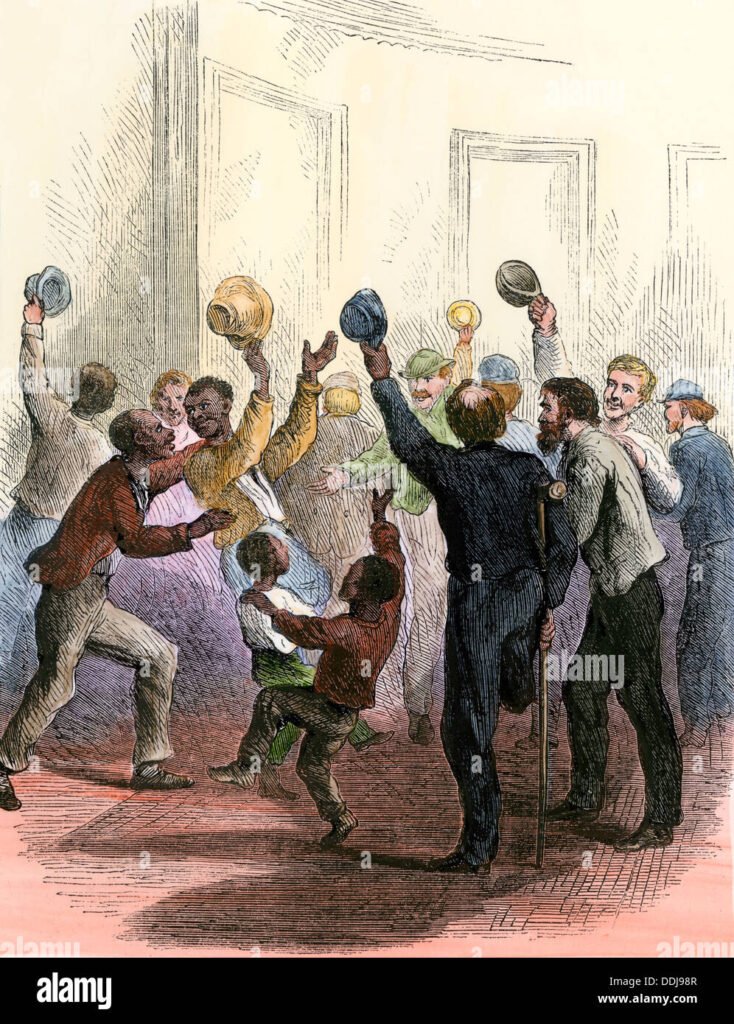The 14th Amendment: A Milestone in Expanding Civil Rights

Historical Context of the 14th Amendment
The passage of the 14th Amendment on June 13, 1866, was a pivotal moment in the trajectory of civil rights in the United States. To fully appreciate its significance, one must examine the tumultuous historical backdrop that preceded it. The Civil War (1861-1865) served as a catalyst for significant social and political change, culminating in the transformation of the legal framework surrounding citizenship and individual liberties. This period was marked by intense conflict, as the Northern states fought to preserve the Union and assert the principles of liberty and equality, while the Southern states, steeped in a culture of slavery, aimed to uphold their way of life.
The Emancipation Proclamation, issued by President Abraham Lincoln in 1863, played a crucial role in reshaping public consciousness and legal standings regarding enslaved individuals. While the Proclamation declared that all enslaved people in the Confederate states were to be set free, it also laid the groundwork for envisioning a future where the rights of African Americans would be acknowledged and protected. The abolition of slavery, formalized by the 13th Amendment in 1865, underscored the necessity for a legal framework to ensure that formerly enslaved individuals could enjoy the full spectrum of civil rights.
In this climate of transformation, the 14th Amendment emerged as a legislative response to the urgent need for constitutional guarantees of equal protection and due process for all citizens, particularly those who had endured systemic injustice. The amendment’s innovative provisions aimed to rectify historical inequities and define citizenship in a more inclusive manner, addressing the rights of individuals regardless of race. This progressive shift reflected a growing recognition that democracy and civil rights could not be fully realized without the acknowledgment of the rights of all individuals, thus setting a legal precedent that would echo through the civil rights movements of the future.
Key Provisions of the 14th Amendment
The 14th Amendment to the United States Constitution represents a significant advancement in the protection of civil rights, particularly for formerly enslaved individuals following the Civil War. This amendment encompasses several key provisions, most notably the Citizenship Clause, the Due Process Clause, and the Equal Protection Clause. Each of these clauses plays a pivotal role in fostering equality and safeguarding individual rights within the framework of American law.
The Citizenship Clause, which is articulated in Section 1 of the amendment, asserts that all persons born or naturalized in the United States are citizens, thereby nullifying the Dred Scott v. Sandford decision that denied citizenship to African Americans. This clause was a fundamental shift in legal status for millions and has implications that extend beyond slavery, influencing issues of immigration and naturalization in modern times.
Next, the Due Process Clause prohibits state and local governments from depriving individuals of life, liberty, or property without due process of law. This clause essentially ensures that legal proceedings are fair and that individuals receive equal protection of the laws, extending its influence into realms such as education, privacy rights, and personal autonomy. The significance of this clause is apparent in landmark Supreme Court cases, where it has been invoked to challenge unjust practices and policies.
Lastly, the Equal Protection Clause mandates that no state shall deny any person within its jurisdiction the equal protection of the laws. This clause has served as a foundation for numerous civil rights movements, addressing issues such as racial segregation and discrimination based on gender and sexual orientation. Its ongoing relevance is evident in current debates surrounding affirmative action and LGBTQ+ rights, emphasizing the continuing evolution of civil liberties in the United States.
Impact and Significance of the 14th Amendment
The 14th Amendment, ratified in 1868, has had a profound influence on American society, fundamentally reshaping the legal landscape of civil rights. This amendment guarantees citizenship rights and equal protection under the law, significantly advancing the fight against discrimination. Its introduction marked a critical point in U.S. history, addressing the injustices faced by formerly enslaved individuals and ensuring their integration into the socio-political fabric of the nation.
One cannot discuss the significance of the 14th Amendment without referencing landmark Supreme Court cases that have further defined civil rights in America. The case of Brown v. Board of Education (1954) is particularly noteworthy, as it utilized the Equal Protection Clause of the 14th Amendment to challenge racially segregated public schools. The Court’s ruling declared that “separate but equal” educational facilities were inherently unequal, thus paving the way for desegregation and serving as a catalyst for the civil rights movement of the 1960s.
Another pivotal case, Roe v. Wade (1973), invoked the 14th Amendment to recognize a woman’s right to privacy in making decisions about abortion. This ruling significantly impacted women’s rights and reignited debates surrounding personal autonomy and state control, further illustrating how the 14th Amendment continues to evolve in contemporary legal discourse.
Despite these advancements, the journey toward equality remains fraught with challenges. Discrimination persists in various forms, and movements advocating for civil rights continue to grapple with issues rooted in systemic inequality. The 14th Amendment stands at the forefront of these struggles, providing a legal foundation upon which advocates draw to assert their rights and challenge injustices. Its enduring significance is evidenced by ongoing conversations about citizenship, equality, and human rights, affirming the necessity of this amendment in the continuous pursuit of justice within American society.
Contemporary Relevance of the 14th Amendment
The 14th Amendment, ratified in 1868, serves as a critical cornerstone in the ongoing struggle for civil rights within the United States. Its provisions guarantee citizenship and equal protection under the law, principles that continue to resonate strongly in contemporary society. Present-day movements, such as Black Lives Matter and the LGBTQ+ rights campaign, frequently invoke the 14th Amendment to advocate for equality and comprehensive reforms. These movements highlight the amendment’s role in addressing systemic discrimination and ensuring fair treatment for all individuals, regardless of race or sexual orientation.
In the context of Black Lives Matter, activists emphasize the amendment’s Equal Protection Clause to argue against police brutality and systemic racism. The phrase “Black Lives Matter” encapsulates a push for society to acknowledge and rectify the historical injustices faced by African Americans. By invoking the 14th Amendment, activists position their demands firmly within a legal framework that calls for accountability and justice, illuminating the continuing relevance of this historic legislation in today’s social justice movements.
Moreover, the 14th Amendment has been instrumental in advancing LGBTQ+ rights in the United States. Significant court decisions concerning marriage equality and anti-discrimination laws have relied on the principles established by this amendment. By asserting their right to equal treatment, LGBTQ+ advocates utilize the 14th Amendment to challenge discriminatory practices and enshrine protections against bias in various aspects of life, affirming their identity and rights as citizens.
Additionally, ongoing debates surrounding immigration and citizenship further underline the amendment’s enduring significance. The 14th Amendment has been central to discussions about birthright citizenship and the legal status of undocumented immigrants. As society grapples with questions of identity, belonging, and the legal implications of immigration policies, the 14th Amendment continues to shape American legal standards and define the narrative of inclusivity and equality in contemporary discourse.
Share this content:
